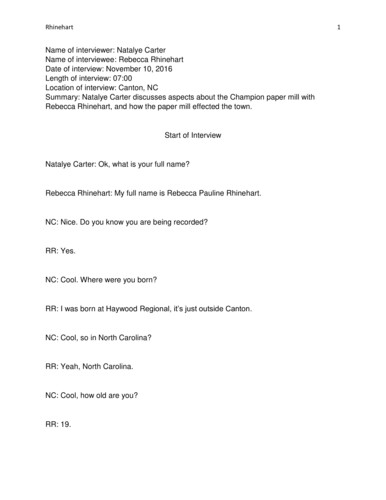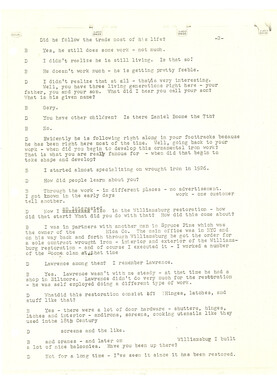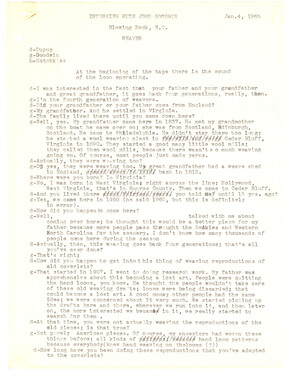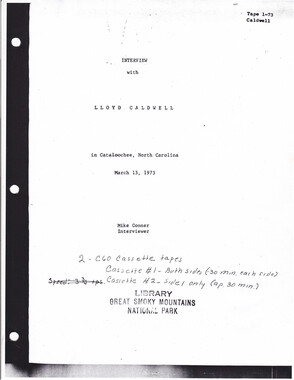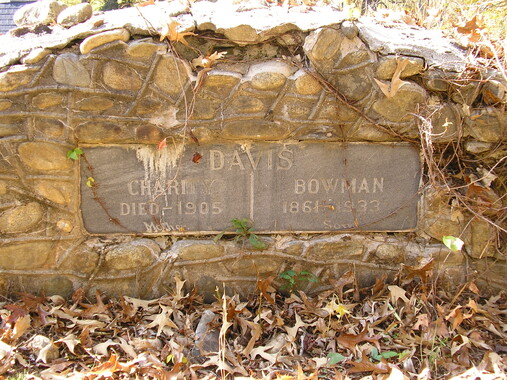Western Carolina University (20)
View all
- Canton Champion Fibre Company (2308)
- Cherokee Traditions (293)
- Civil War in Southern Appalachia (165)
- Craft Revival (1942)
- Great Smoky Mountains - A Park for America (2683)
- Highlights from Western Carolina University (430)
- Horace Kephart (941)
- Journeys Through Jackson (154)
- LGBTQIA+ Archive of Jackson County (15)
- Oral Histories of Western North Carolina (314)
- Picturing Appalachia (6679)
- Stories of Mountain Folk (413)
- Travel Western North Carolina (160)
- Western Carolina University Fine Art Museum Vitreograph Collection (129)
- Western Carolina University Herbarium (92)
- Western Carolina University: Making Memories (708)
- Western Carolina University Publications (2283)
- Western Carolina University Restricted Electronic Theses and Dissertations (146)
- Western North Carolina Regional Maps (71)
- World War II in Southern Appalachia (131)
University of North Carolina Asheville (6)
View all
- 1700s (1)
- 1860s (1)
- 1890s (1)
- 1900s (2)
- 1920s (2)
- 1930s (5)
- 1940s (12)
- 1950s (19)
- 1960s (35)
- 1970s (31)
- 1980s (16)
- 1990s (10)
- 2000s (20)
- 2010s (24)
- 2020s (4)
- 1600s (0)
- 1800s (0)
- 1810s (0)
- 1820s (0)
- 1830s (0)
- 1840s (0)
- 1850s (0)
- 1870s (0)
- 1880s (0)
- 1910s (0)
- Appalachian Region, Southern (15)
- Asheville (N.C.) (11)
- Avery County (N.C.) (1)
- Buncombe County (N.C.) (55)
- Cherokee County (N.C.) (17)
- Clay County (N.C.) (2)
- Graham County (N.C.) (15)
- Great Smoky Mountains National Park (N.C. and Tenn.) (1)
- Haywood County (N.C.) (40)
- Henderson County (N.C.) (5)
- Jackson County (N.C.) (131)
- Knox County (Tenn.) (1)
- Macon County (N.C.) (17)
- Madison County (N.C.) (4)
- McDowell County (N.C.) (1)
- Mitchell County (N.C.) (5)
- Polk County (N.C.) (3)
- Qualla Boundary (6)
- Rutherford County (N.C.) (1)
- Swain County (N.C.) (30)
- Watauga County (N.C.) (2)
- Waynesville (N.C.) (1)
- Yancey County (N.C.) (3)
- Blount County (Tenn.) (0)
- Knoxville (Tenn.) (0)
- Lake Santeetlah (N.C.) (0)
- Transylvania County (N.C.) (0)
- Interviews (314)
- Manuscripts (documents) (3)
- Personal Narratives (7)
- Photographs (4)
- Sound Recordings (308)
- Transcripts (216)
- Aerial Photographs (0)
- Aerial Views (0)
- Albums (books) (0)
- Articles (0)
- Artifacts (object Genre) (0)
- Biography (general Genre) (0)
- Cards (information Artifacts) (0)
- Clippings (information Artifacts) (0)
- Crafts (art Genres) (0)
- Depictions (visual Works) (0)
- Design Drawings (0)
- Drawings (visual Works) (0)
- Envelopes (0)
- Facsimiles (reproductions) (0)
- Fiction (general Genre) (0)
- Financial Records (0)
- Fliers (printed Matter) (0)
- Glass Plate Negatives (0)
- Guidebooks (0)
- Internegatives (0)
- Land Surveys (0)
- Letters (correspondence) (0)
- Maps (documents) (0)
- Memorandums (0)
- Minutes (administrative Records) (0)
- Negatives (photographs) (0)
- Newsletters (0)
- Newspapers (0)
- Occupation Currency (0)
- Paintings (visual Works) (0)
- Pen And Ink Drawings (0)
- Periodicals (0)
- Plans (maps) (0)
- Poetry (0)
- Portraits (0)
- Postcards (0)
- Programs (documents) (0)
- Publications (documents) (0)
- Questionnaires (0)
- Scrapbooks (0)
- Sheet Music (0)
- Slides (photographs) (0)
- Specimens (0)
- Speeches (documents) (0)
- Text Messages (0)
- Tintypes (photographs) (0)
- Video Recordings (physical Artifacts) (0)
- Vitreographs (0)
- WCU Mountain Heritage Center Oral Histories (25)
- WCU Oral History Collection - Mountain People, Mountain Lives (71)
- Western North Carolina Tomorrow Black Oral History Project (69)
- A.L. Ensley Collection (0)
- Appalachian Industrial School Records (0)
- Appalachian National Park Association Records (0)
- Axley-Meroney Collection (0)
- Bayard Wootten Photograph Collection (0)
- Bethel Rural Community Organization Collection (0)
- Blumer Collection (0)
- C.W. Slagle Collection (0)
- Canton Area Historical Museum (0)
- Carlos C. Campbell Collection (0)
- Cataloochee History Project (0)
- Cherokee Studies Collection (0)
- Daisy Dame Photograph Album (0)
- Daniel Boone VI Collection (0)
- Doris Ulmann Photograph Collection (0)
- Elizabeth H. Lasley Collection (0)
- Elizabeth Woolworth Szold Fleharty Collection (0)
- Frank Fry Collection (0)
- George Masa Collection (0)
- Gideon Laney Collection (0)
- Hazel Scarborough Collection (0)
- Hiram C. Wilburn Papers (0)
- Historic Photographs Collection (0)
- Horace Kephart Collection (0)
- Humbard Collection (0)
- Hunter and Weaver Families Collection (0)
- I. D. Blumenthal Collection (0)
- Isadora Williams Collection (0)
- Jesse Bryson Stalcup Collection (0)
- Jim Thompson Collection (0)
- John B. Battle Collection (0)
- John C. Campbell Folk School Records (0)
- John Parris Collection (0)
- Judaculla Rock project (0)
- Kelly Bennett Collection (0)
- Love Family Papers (0)
- Major Wiley Parris Civil War Letters (0)
- Map Collection (0)
- McFee-Misemer Civil War Letters (0)
- Mountain Heritage Center Collection (0)
- Norburn - Robertson - Thomson Families Collection (0)
- Pauline Hood Collection (0)
- Pre-Guild Collection (0)
- Qualla Arts and Crafts Mutual Collection (0)
- R.A. Romanes Collection (0)
- Rosser H. Taylor Collection (0)
- Samuel Robert Owens Collection (0)
- Sara Madison Collection (0)
- Sherrill Studio Photo Collection (0)
- Smoky Mountains Hiking Club Collection (0)
- Stories of Mountain Folk - Radio Programs (0)
- The Reporter, Western Carolina University (0)
- Venoy and Elizabeth Reed Collection (0)
- WCU Gender and Sexuality Oral History Project (0)
- WCU Students Newspapers Collection (0)
- William Williams Stringfield Collection (0)
- Zebulon Weaver Collection (0)
- African Americans (97)
- Artisans (5)
- Cherokee pottery (1)
- Cherokee women (1)
- College student newspapers and periodicals (4)
- Education (3)
- Floods (13)
- Folk music (3)
- Great Smoky Mountains National Park (N.C. and Tenn.) (1)
- Hunting (1)
- Mines and mineral resources (2)
- Rural electrification -- North Carolina, Western (2)
- School integration -- Southern States (2)
- Segregation -- North Carolina, Western (5)
- Slavery (5)
- Sports (2)
- Storytelling (3)
- World War, 1939-1945 (3)
- Appalachian Trail (0)
- Cherokee art (0)
- Cherokee artists -- North Carolina (0)
- Cherokee language (0)
- Church buildings (0)
- Civilian Conservation Corps (U.S.) (0)
- Dams (0)
- Dance (0)
- Forced removal, 1813-1903 (0)
- Forest conservation (0)
- Forests and forestry (0)
- Gender nonconformity (0)
- Landscape photography (0)
- Logging (0)
- Maps (0)
- North Carolina -- Maps (0)
- Paper industry (0)
- Postcards (0)
- Pottery (0)
- Railroad trains (0)
- Waterfalls -- Great Smoky Mountains (N.C. and Tenn.) (0)
- Weaving -- Appalachian Region, Southern (0)
- Wood-carving -- Appalachian Region, Southern (0)
- Sound (308)
- StillImage (4)
- Text (219)
- MovingImage (0)
Interview with Rebecca Rhinehart
Item
Item’s are ‘child’ level descriptions to ‘parent’ objects, (e.g. one page of a whole book).
-
-
Rhinehart 1 Name of interviewer: Natalye Carter Name of interviewee: Rebecca Rhinehart Date of interview: November 10, 2016 Length of interview: 07:00 Location of interview: Canton, NC Summary: Natalye Carter discusses aspects about the Champion paper mill with Rebecca Rhinehart, and how the paper mill effected the town. Start of Interview Natalye Carter: Ok, what is your full name? Rebecca Rhinehart: My full name is Rebecca Pauline Rhinehart. NC: Nice. Do you know you are being recorded? RR: Yes. NC: Cool. Where were you born? RR: I was born at Haywood Regional, it’s just outside Canton. NC: Cool, so in North Carolina? RR: Yeah, North Carolina. NC: Cool, how old are you? RR: 19. Rhinehart 2 NC: Oh, you’re 19? RR: Yeah. NC: So, what year were you born? RR: 1997. NC: Nice, alright now we’ll get to the more specific questions. Those are the broad ones that I ask everybody. RR: Alright. NC: Where did you grow up? RR: I grew up on Radio Hill in Canton. NC: Alright, when I say Champion Paper Mill what comes to mind? RR: The smell is the first thing that everyone thinks about. I guess, I don’t know. [Laughter] NC: That’s fine. What did the Canton paper mill mean to you? RR: Our town was made around it, so everything comes back to the mill. NC: Ok. Was the mill a direct part of your life? RR: I had Uncles and cousins that worked there, so it was kind of a direct. Rhinehart 3 NC: Ok, so you had immediate family members? RR: Yeah immediate. NC: Ok, you obviously don’t have any children so the next question doesn’t apply to you. How did the mill effect your way of life, and how did it affect your environment or community? RR: At the high school we had a class on paper making because a lot of students that would graduate, they would end up working at the mill. So this class prepared you and there was different levels and at the end of taking four levels you were almost guaranteed a job at the mill at graduation. NC: Oh wow. That’s really cool I didn’t know that. RR: Yeah I took the first level. [Laughter] NC: Oh nice. RR: Yeah it was pretty fun. NC: That’s really cool. Did the mill effect Canton society in your opinion culturally, socially, economically, why or why not? RR: I feel like a lot of kids, that all of their family works in them and all of the working class people in Canton, you know somebody who works there or are related to them. And the whole town spreads out from the mill. NC: Cool, so I know there was a period where the mill has changed so many people’s hands like it’s been handed over, bought, sold, and all that other stuff. So how do you think that effects the community? Rhinehart 4 RR: It adds a bunch of skepticism about the big companies always swooping in and changing the names of it but everyone calls it Champion. I don’t even know what it’s called, I think it’s Evergreen now? NC: Yeah. RR: But everyone still calls it Champion. NC: Cool, well that’s good to know. How should people remember the mill? RR: It’s something that employed almost everyone in the town and the surrounding area, and it gave a bunch of people a livelihood. NC: Should the mill be an important part of local or state history? RR: Definitely. Not a lot of mills like that still exist and thrive like Champion does so it’s definitely something to remember and watch change over the years. NC: Ok, so I only have one question left. My part of the paper, what I’m doing for the research paper on, is how the mill effected the community and what it did to the community as a whole. So is there anything you’d like to add in reference to that? RR: Trying to think of; everything is based around the mill. Our downtown is right beside it, can’t think of anything super more specific. NC: That’s fine. [Laughter]. So I feel like I drove past the mill. RR: Yeah. NC: Is the mill huge? Rhinehart 5 RR: It’s huge. There’s multiple parts of it too, it’s also a waste water treatment plant so there’s a section of that. But there’s those two big stacks. It’s the entire center of town; to get to one opposite end of town you have to go around the mill, you can’t just pass through. NC: Yeah I think I’ve been past the mill to get to the Arby’s. RR: To get to the Arby’s yeah. NC: Yeah cool. In Canton? RR: In Canton. NC: Cool, ok. So I guess that’s it. RR: Alright. NC: Oh, let me get you to sign the release form. RR: Alright. NC: What was it like growing up in Canton? RR: It was your pretty basic rural, southern town. But you were close enough to Asheville to where you could get a little bit of city. NC: Yeah. I feel you. Rhinehart 6 RR: But it smells. One time at a football game the away team brought a sign that said does your football team stink as bad as your town? [Laughter] NC: Are you serious? RR: Yes. NC: Oh my god, that’s awful. NC: You can read over it, if you want to make any restrictions like you don’t want it to be released for ten years or whatever. RR: Oh yeah, it’s fine. There’s nothing really super important in there like “Oh hey I grew up in Canton”. I’m sure the old people have way more to say this. NC: Yeah I had an interview that lasted about an hour. RR: Dang that’s so cool. NC: I know it is really cool. RR: But I’m pretty sure Joanne, she might be in her seventies, or might even be in her eighties. But she grew up right above me and her trailer was put where she grew up. END OF INTERVIEW
Object
Object’s are ‘parent’ level descriptions to ‘children’ items, (e.g. a book with pages).
-
Natalye Carter discusses aspects about the Champion paper mill with Rebecca Rhinehart, and how the paper mill affected the town.
-
